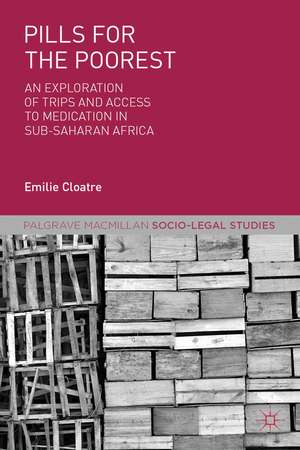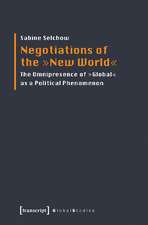Pills for the Poorest: An Exploration of TRIPS and Access to Medication in Sub-Saharan Africa
Autor E. Cloatreen Limba Engleză Hardback – 6 aug 2013
Pills for the Poorest offers a new perspective on the much-debated issue of the links between intellectual property and access to medication. Using ethnographic case studies in Djibouti and Ghana, and insights from actor-network theory, it explores the ways in which TRIPs and pharmaceutical patents are translated in the daily practices of those who purchase, distribute, and use (or fail to use) medicines in sub-Saharan Africa. It suggests that focusing on routine practices and the material deployment of intellectual property significantly enriches our understanding of the complex dynamics that animate the field of access to medicines and helps relocate the role of law within those processes. It demonstrates how intellectual property affects access to medicines in ways that are often discreet, indirect and forgotten. By exploring these complex mechanisms, it seeks to ask questions about the modes of actions of pharmaceutical patents, but also, more generally, about the complexity of legal objects.
Preț: 642.51 lei
Preț vechi: 755.88 lei
-15% Nou
Puncte Express: 964
Preț estimativ în valută:
122.94€ • 133.97$ • 103.60£
122.94€ • 133.97$ • 103.60£
Carte tipărită la comandă
Livrare economică 23 aprilie-07 mai
Preluare comenzi: 021 569.72.76
Specificații
ISBN-13: 9780230282841
ISBN-10: 0230282849
Pagini: 224
Ilustrații: XII, 204 p.
Dimensiuni: 155 x 235 x 17 mm
Greutate: 0.48 kg
Ediția:2013
Editura: Palgrave Macmillan UK
Colecția Palgrave Macmillan
Locul publicării:London, United Kingdom
ISBN-10: 0230282849
Pagini: 224
Ilustrații: XII, 204 p.
Dimensiuni: 155 x 235 x 17 mm
Greutate: 0.48 kg
Ediția:2013
Editura: Palgrave Macmillan UK
Colecția Palgrave Macmillan
Locul publicării:London, United Kingdom
Cuprins
Introduction: Global IP and Pills for the Poorest.- 1. TRIPS as Assemblage .- 2. From Global Scripts to Local Translation .- 3. From IP to Public Health in Djibouti and Ghana .- 4. Pharmaceutical Patents as Silent Regulatory Tools: Escaping Branded Drugs in Djibouti .- 5. Ghana, Pharmaceutical Patents and the Ambivalence of Generic Medicines.- 6. Global Movements, Changing Markets and the Reshaping of Health and Disease.- Conclusion: Pharmaceuticals and Socio-Legal Ambivalence.
Notă biografică
Emilie Cloatre is a Senior Lecturer at Kent Law School, University of Kent, UK.
Textul de pe ultima copertă
The desperate need for a vast part of the global population to access better medicines in more certain ways is one of the biggest concerns of the modern era.
Pills for the Poorest offers a new perspective on the much-debated issue of the links between intellectual property and access to medication. Using ethnographic case studies in Djibouti and Ghana, and insights from actor-network theory, it explores the ways in which TRIPs and pharmaceutical patents are translated in the daily practices of those who purchase, distribute, and use (or fail to use) medicines in sub-Saharan Africa. It suggests that focusing on routine practices and the material deployment of intellectual property significantly enriches our understanding of the complex dynamics that animate the field of access to medicines and helps relocate the role of law within those processes. It demonstrates how intellectual property affects access to medicines in ways that are often discreet, indirect and forgotten. By exploring these complex mechanisms, it seeks to ask questions about the modes of actions of pharmaceutical patents, but also, more generally, about the complexity of legal objects.
Pills for the Poorest offers a new perspective on the much-debated issue of the links between intellectual property and access to medication. Using ethnographic case studies in Djibouti and Ghana, and insights from actor-network theory, it explores the ways in which TRIPs and pharmaceutical patents are translated in the daily practices of those who purchase, distribute, and use (or fail to use) medicines in sub-Saharan Africa. It suggests that focusing on routine practices and the material deployment of intellectual property significantly enriches our understanding of the complex dynamics that animate the field of access to medicines and helps relocate the role of law within those processes. It demonstrates how intellectual property affects access to medicines in ways that are often discreet, indirect and forgotten. By exploring these complex mechanisms, it seeks to ask questions about the modes of actions of pharmaceutical patents, but also, more generally, about the complexity of legal objects.
Caracteristici
Interdisciplinary crosses law, sociology, economics and public health Strong international appeal Innovative use of ActorNetwork Theory, a methodology much of interest to academics and researchers Part of the Palgrave Macmillan SocioLegal Studies series

















